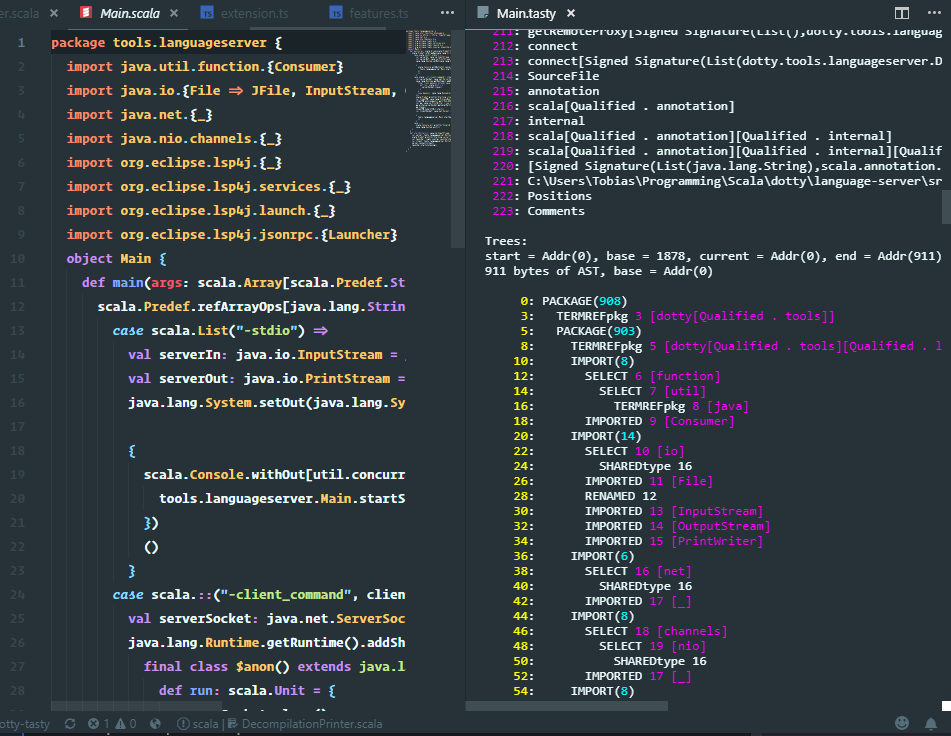Announcing Dotty 0.12.0-RC1
Happy New Year to all with the first release of Dotty for 2019! ✨🎊🎉
Today we are excited to release the version 0.12.0-RC1 of the Dotty compiler. This release serves as a technology preview that demonstrates new language features and the compiler supporting them.
Dotty is the project name for technologies that are considered for inclusion in Scala 3. Scala has pioneered the fusion of object-oriented and functional programming in a typed setting. Scala 3 will be a big step towards realising the full potential of these ideas. Its main objectives are to
- become more opinionated by promoting programming idioms we found to work well,
- simplify where possible,
- eliminate inconsistencies and surprising behaviours,
- build on strong foundations to ensure the design hangs well together,
- consolidate language constructs to improve the language’s consistency, safety, ergonomics, and performance.
You can learn more about Dotty on our website.
This is our 12th scheduled release according to our 6-week release schedule.
What’s new in the 0.12.0-RC1 technology preview?
Extension Methods
We are excited to announce that extension methods are now offered through dedicated language support! Extension methods allow one to add methods to a type after the type is defined. This is done by writing a method with a parameter for the type to be extended on the left-hand side of the method name:
case class Circle(x: Double, y: Double, radius: Double)
def (c: Circle) circumference: Double = c.radius * math.Pi * 2
Extension methods are enabled when they are syntactically in scope (as above), or when their enclosing instance is present in the implicit scope of the type that they extend, as we exemplify below.
Extension methods were previously encoded in a rather roundabout way via the implicit class pattern. Such encoding required a lot of boilerplate, especially when defining type classes. In Dotty, this is no longer the case, and type classes with infix syntax become very straightforward to define! For example, consider:
trait Semigroup[T] {
def (x: T) combine (y: T): T
}
implicit val IntSemigroup: Semigroup[Int] = new {
def (x: Int) combine (y: Int): Int = x + y
}
implicit def ListSemigroup[T]: Semigroup[List[T]] = new {
def (x: List[T]) combine (y: List[T]): List[T] = x ::: y
}
1.combine(2) // == 3
List(1,2).combine(List(3,4)) // == List(1,2,3,4)
This works because the combine extension methods of IntSemigroup and ListSemigroup are available from the relevant implicit scopes.
Read the full documentation about generic extension methods, higher-kinded extension methods, and more.
TASTy Reflect goodies
We implement a new decompiler for TASTy files and we also offer a new VS Code Extension. The decompiler allows to view both decompiled scala source code and the pretty printed TASTy tree when opening a .tasty file. The feature is similar to opening .class files in IntelliJ.

The decompiler can be invoked with the corresponding flag: dotc -decompile xyz.tasty.
On the programmatic side of TASTy we are rolling out changes according to our plan discussed at Macros: The Plan for Scala 3. In this release, we make progress following the Next Steps of the aforementioned blogpost by offering constructors that work directly with reflect trees. Consequently, TASTy extractors meet their dual, TASTy constructors! We also connect the new lower-level reflection layer to the existing principled macro system based on quotes and splices offering, two new expression methods for Expr[T]:
unsealthat unseals anExpr[T](non traversable code) into aTermandsealthat seals back aTerminto anExpr[T].
Read the relevant documentation to learn how to go from quotes and splices to TASTys Reflect trees and back .
Alignments with the Scala Improvement Process
In this version we improve the implementation of by-name implicits making it compliant with the By-name Implicits SIP and we implement the ValueOf operator which yields the unique value of types with a single inhabitant, effectively syncing it up with the Literal-Based Singleton Types SIP.
Improvements to GADT support
In this release, we're also rolling out the first batch of improvements to GADT support - namely, variable unification. To keep it short, from knowing that A <: B and B <: A, we can now deduce that A = B, and from A = B and B <: C we deduce that A <: C. This kind of reasoning is necessary for many advanced GADT usages!
And much more!
Please read our release notes for more details!
Trying out Dotty
sbt
You can set up a new sbt project with Dotty as the compiler by running:
sbt new lampepfl/dotty.g8
For more details on using Dotty with sbt, see the example project.
Mill
The Mill build tool version 0.2.6 introduced experimental support for Dotty. For more details on using Dotty with Mill, see the example project.
IDE support
Start using the Dotty IDE in any Dotty project by following the IDE sections of the getting-started page.
Standalone installation
Releases are available for download on the Releases section of the Dotty repository: https://github.com/scala/scala3/releases
For macOS users, we also provide a homebrew package that can be installed by running:
brew install lampepfl/brew/dotty
In case you have already installed Dotty via brew, you should instead update it:
brew upgrade dotty
Let us know what you think!
If you have questions or any sort of feedback, feel free to send us a message on our Gitter channel. If you encounter a bug, please open an issue on GitHub.
Contributing
Thank you to all the contributors who made this release possible!
According to git shortlog -sn --no-merges 0.11.0-RC1..0.12.0-RC1 these are:
109 Martin Odersky
64 Nicolas Stucki
34 Martin Duhem
25 Allan Renucci
16 Guillaume Martres
12 Aleksander Boruch-Gruszecki
11 Tobias Bordenca
10 Miles Sabin
10 Liu Fengyun
7 Aggelos Biboudis
7 Jaemin Hong
5 Paolo G. Giarrusso
3 duanebester
3 Dotty CI
2 Sébastien Doeraene
2 Saurabh Rawat
2 Vlastimil Dort
1 tOverney
1 Denis Buzdalov
1 Hermes Espínola González
1 Ivan Youroff
1 João Pedro de Carvalho
1 Neeraj Jaiswal
1 Olivier Blanvillain
1 poechsel
1 Abel Nieto
If you want to get your hands dirty and contribute to Dotty, now is a good time to get involved! Head to our Getting Started page for new contributors, and have a look at some of the good first issues. They make perfect entry points into hacking on the compiler.
We are looking forward to having you join the team of contributors.
